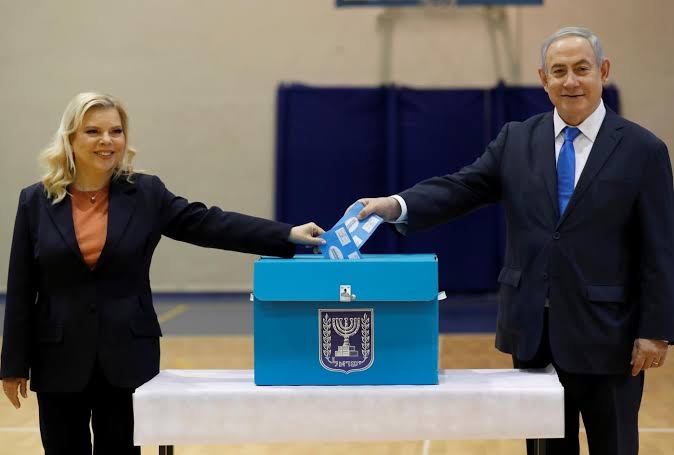FRESH AIR
Understanding the Israeli election result
March 3, 2020 | Ahron Shapiro

Israeli Prime Minister Binyamin Netanyahu surprised critics after polls closed last night when he had elevated his Likud party to its highest-ever result under his leadership – up to an estimated 37 seats, according to exit polls, with his rival Benny Gantz’s Blue and White party lagging behind with anywhere from between 32-34 seats. Moreover, Netanyahu’s right-wing and religious bloc has increased in size from 55 seats to an estimated 59 seats, with Gantz’ bloc of potential partners, again, well behind at 54-55 seats.
While these projections will need to be tested in the actual vote count over the coming days, this still leaves Netanyahu short of a 61-seat majority and his path to forming a government is unclear, meaning a fourth election still remains very possible should Netanyahu fail to convince other parties to join a narrow coalition or form a national unity government.
On the other hand, Blue and White’s path to forming a government alone is practically non-existent, and it lost the advantage it held after the last election in September 2019, when it received more votes than the Likud.
How to explain Netanyahu’s resurgence, particularly in light of the fact that he has been indicted for bribery, fraud and breach of trust, with hearings set to begin on March 17?
And how is it that Blue and White somehow retreated from the achievements it had accumulated in elections last April and September?
The key to understanding the shift is to remember a significant group supporting Gantz were Likud voters that parted ways with Netanyahu over his criminal cases. Many of these voters simply came back home to the Likud, which is why – when polls began to shift in Likud’s favour some two weeks ago – Blue and White simultaneously registered a corresponding drop in support.
But why did these Likud voters return from Blue and White’s “anyone but Netanyahu” party to the “only Bibi” party? Did they somehow change their minds about the validity of the case against Netanyahu?
Perhaps a few did. Almost certainly however, more of them were won over by the Likud’s campaign mantra that” Gantz can’t form a government without [the Arab and far-left Joint List party’s polarising Ta’al faction leader] Ahmed Tibi.”
In other words, the Likud argued, and its pool of current and former supporters apparently agreed, that Gantz had no path to a centre-left government without the support – even tacitly – of the Joint List, a party which had already said it would predicate any support for Gantz with a moratorium on retaliatory strikes against terrorist bases in the Gaza Strip, among other problematic demands.
Meanwhile, Gantz’s hope was to pull so far ahead of the Likud that the pragmatic ultra-Orthodox parties would be ready to join a coalition led by Blue and White. Yet in order to continue growing his party, Gantz needed to attract thousands more Likud defectors. To this end, his campaign tried its best to attack Netanyahu, even comparing him to illiberal autocrats like Turkish President Recep Tayyip Ergodan. Such attacks backfired, interpreted as wild exaggeration and a sign of desperation.
In contrast, the Likud campaign’s spotlight on Gantz’s potential dependence on the Joint List worked like a charm, and on two levels. It deterred more Likud voters from bolting to Blue and White while sowing doubt in the minds of those who had already left Likud over the wisdom of having done so.
Above all, it appears Israeli voters were motivated by the desire to avoid a fourth election, and the Likud made a good argument that the safest bet for achieving a coalition would be to coalesce around the familiar and stable coalition framework that guided Israel through the past decade of relative calm and economic prosperity – a centre-right or national unity government anchored by the Likud.
There are other subplots to this election: The Joint List’s impressive Arab turnout, largely in a negative response to US President Trump’s “Deal of the Century” peace framework but also a sign of the younger generation’s desire for greater participation in the Knesset; the electoral failure of the Zionist left; the stagnation of the pro-settler right; and the repeated failure of the far-right Jewish Power party to enter the Knesset.
But the results from yesterday’s election for the 23rd Knesset should be seen, more than anything else, as an expression of resolve by an exhausted nation to keep the election for the 24th Knesset as far away as possible.
RELATED ARTICLES

‘Time’s up for talk’: Joel Burnie discusses Antisemitism Envoy’s report on Sky News

‘Optimism’ for Hamas to ‘exile’ their power and create a permanent ceasefire with Israel: Joel Burnie on Sky News

Australian government’s response to Iran-Israel conflict ‘disappointing’: Paul Rubenstein on Sky News




















